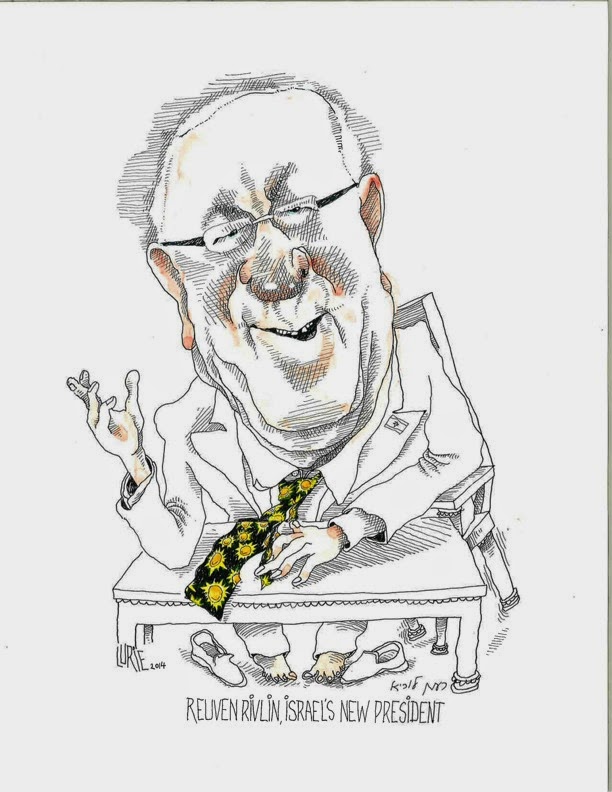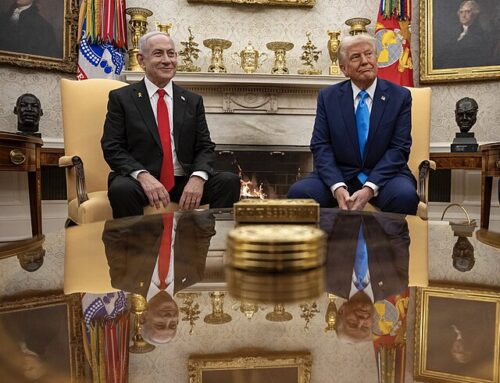 Last Tuesday, my cousin “Ruby” Reuven Rivlin emerged from two rounds of voting in the Knesset to become the 10th president of the State of Israel. It is said that being president in Israel is largely a ceremonial office, but look at what Shimon Peres did with it! The president receives all visiting dignitaries, he travels in the world representing Israel; for all intents and purposes, he becomes the face of Israel. And so, my wish for “Ruvi” (his name within the family) is that he will represent ALL OF ISRAEL’S CITIZENS.
Last Tuesday, my cousin “Ruby” Reuven Rivlin emerged from two rounds of voting in the Knesset to become the 10th president of the State of Israel. It is said that being president in Israel is largely a ceremonial office, but look at what Shimon Peres did with it! The president receives all visiting dignitaries, he travels in the world representing Israel; for all intents and purposes, he becomes the face of Israel. And so, my wish for “Ruvi” (his name within the family) is that he will represent ALL OF ISRAEL’S CITIZENS.
 |
| Cartoon by Ranan Lurie (also a Rivlin relative) |
Since Ruvi’s election, every Rivlin claims him as a cousin, so let me begin by saying Ruvi is truly my first cousin. His mother, my father’s sister Ray (Rachel) Rivlin was my favorite aunt. She was one of 12 children born to Jerusalemites Yosef and Alta Rivlin who left Palestine for England after W.W. I. The cholera epidemic in Jerusalem and the economic downturn made it a difficult city in which to raise children. (For more on my family, see my film “The Tribe.”) Yosef and Alta moved from England to Brooklyn, creating more children along the way, culminating in a dozen. I might add, that one son became a Conservative Rabbi. Suffice it is to say, my grandparents returned to Palestine in 1929, and some of their children followed. Rachel (Ray) was the first to return. In the early days of the Yishuv, especially in Jerusalem, marriages took place within the extended families. Ray married a distant cousin who died a few years later, leaving her a young widow with two children. Family matchmakers soon coupled her with Yosef Yoel Rivlin, also widowed, and not long after, Reuven was born. (We Rivlins are into genealogy, and if you want more history, here is a link to a recent article.)
Cousin Ruvi has clearly represented the Right of the Israeli political spectrum. By way of contrast, I am a Left-wing activist who lives somewhere between fear and hope as to how he will fulfill the role of being president of all of Israel’s citizens. True, I live in New York City, but my first eight years were spent in Jerusalem. I also lived there in the 1960s, and was there during the 1967 war; my life has been entwined with what happens in Israel. Therefore, I worry.
Ruvi grew up in a household that revered the nationalistic “Revisionist” Zionist Vladimir Jabotinsky. His father Yosef Yoel was an “Orientalist” — the term then used for Arab and Eastern studies — who received his Ph.D. in Germany, at that time the hub of the discipline. Prof. Yosef Yoel Rivlin translated the Koran and A Thousand and One Arabian Nights into Hebrew, and wrote extensively about Islam and Arab culture. He had many Arab friends and was also once a candidate for the Presidency of Israel.
Today Ruvi is known as a hawk; he is pro-settlement and against a two-state solution, but in the last few years he has advocated for one bi-national state. He has stated on a number of occasions that he would prefer a bi-national state that granted Palestinians full citizenship, over any plans that would divide the land. He admits he is a utopian in this regard. When pressed about an Arab majority in this future state, he has a vision that all the Jews in the world will come to Israel.
Now I have to admit that about five years ago, not seeing any progress on the negotiation front, I too began to think in terms of a bi-national state. Each time I went on Meretz USA’s and then PPI’s annual “Israel Symposium,” I would challenge those we met to join me in thinking about it. Among the journalists, intellectuals and politicians we conferred with, I found none who gave the One-State concept much credence. It won’t work, they all said.
Ruvi is a dreamer. Ruvi is also parochial. In the 1990’s, when I was on the board of Women of the Wall, I called upon him to lobby on their behalf. He yelled at me as only a cousin can: “You are nothing but a provocateur,” he said. “They are the real Jews, [meaning the rabbis of the Wall], not people like you.” I stopped talking to him for at least seven years, until former Meretz MK Abu Vilan insisted on taking me to see Ruvi in the Knesset when our Symposium group visited there. We made sulcha (truce). Since then, every time we visit the Knesset, I have my private moments with Ruvi, and on several occasions, especially when he was Speaker, he introduced me to his “best friend,” Deputy Speaker of the Knesset, MK Dr. Ahmed Tibi, founder of the Arab Movement for Change party, Ta’al, and a former adviser to President Arafat. Ruvi and Dr. Tibi worked together on environmental legislation, I am told. When I went to the village of Kafr Qara, we had lunch with a judge who had been Israel’s counsel general in Atlanta; he told me that Ruvi was instrumental in getting him his judgeship.
On the matter of Reform Judaism, both Eric Yaffe and the present head of the Reform movement refer to Ruvi’s undiplomatic reference to Reform Jews as “idol worshippers” — again, an example of parochialism. Ruvi has never lived anywhere but in Jerusalem. As a politician he needed the Orthodox parties. And, although he is secular, he comes from an observant household. Friday nights at Aunt Ray and Uncle Yosef’s were the best. I loved being there. Anyone who came from abroad and spent Friday night at the Rivlins never forgot it. So what did he know about Reform?
As to his position on Women of the Wall, he grew up in a household where his mother was barely there, because she was serving on the Jerusalem municipality and/or taking care of things at Ezrat Nashim (now Herzog Hospital) or raising money for any number of Jerusalem institutions. Ruvy and his brother Lazie (Eliezer), who died last year, were on the street playing soccer. Nothing prepared him for Women of the Wall or the Reform movement.
In going through articles about him now, one theme stands out to give me hope: He became a voice of reason in the crazy world of Israeli politics. He was a true advocate of democracy in a country that seems to value it less and less.
And so now, with all the brachot (blessings) that are pouring in from Rivlins in Israel and around the world, and others, of course, I add my own: May you be kind and generous to all the citizens of Israel, may you bring your warmth to bear, may you listen and learn from cousins who are part of the Reform movement, and may you understand that even in Israel there will come a time when women will hold up half the sky.



Thank you Lilly Rivkin for a glance at your family’s history.
I too second “Ruvi’s” conversion to a binational state in Israel-Palestine for it is the only rational solution to a small land claimed by two people. I wish him success.
This is the straight Windowssystem Blockiert – varieteofideas München blog for anyone who wants to essay out out about this subject. You remark so often its nearly debilitating to debate with you (not that I rattling would wa€H¢Ãn¦Hata). You definitely put a new extend on a issue thats been printed most for years. Metropolis sundry, but eager!